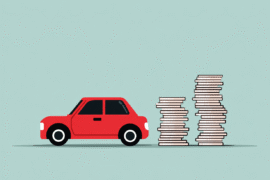This article may contain references to products or services from one or more of our advertisers or partners. We may receive compensation when you click on links to those products or services. Nonetheless, our opinions are our own.
The information presented in this article is accurate to the best of our knowledge at the time of publication. However, information is subject to change, and no guarantees are made about the continued accuracy or completeness of this content after its publication date.
Car payments can become overwhelming, especially when unexpected expenses or a reduction in income make it difficult to keep up. Falling behind on payments may lead to late fees, damage to credit scores, or even vehicle repossession. However, several options are available to help manage financial strain and reduce the burden of an auto loan.
This resource outlines how to negotiate with lenders, where to find financial assistance, and practical steps to create a budget that supports loan payments.
Exploring Options for Car Payment Relief
Acting early can prevent long-term financial setbacks when monthly car payments become challenging. Several solutions exist to reduce the strain of auto loan obligations.
1. Contact the Lender to Discuss Hardship Options
Lenders often provide payment deferrals, loan modifications, or refinancing for borrowers facing financial difficulties. A payment deferral allows a temporary pause, while a loan modification adjusts terms to lower monthly costs. Refinancing may reduce payment by securing a lower interest rate, though approval depends on credit history and the outstanding loan balance.
Since lender policies differ, reaching out early is the best way to explore available options.
2. Research State and Local Assistance Programs
Although government programs specifically for car payments are rare, some financial relief programs assist with transportation-related expenses.
- Temporary Assistance for Needy Families (TANF): This program provides cash assistance to qualifying low-income households, which may be used for transportation costs.
- Emergency Financial Assistance Programs: Some state programs offer grants or low-interest loans to cover necessary expenses, including car payments.
- Local Transportation Assistance: Some community programs assist with car repairs, insurance, or transit costs instead of direct auto loan support.
Checking state websites and nonprofit organizations can help determine eligibility for available programs.
3. Seek Help from Nonprofit Organizations
Most nonprofits do not offer direct car payment assistance but may provide financial support in other ways.
- United Way and Community Action Agencies provide financial counseling and may connect individuals with hardship assistance programs.
- Goodwill and The Salvation Army sometimes assist with car repairs or job-related transportation costs.
- Working Cars for Working Families helps low-income individuals obtain reliable transportation.
Rather than expecting direct loan payments, nonprofit resources can help lower overall financial burdens, making it easier to manage car payments.
4. Explore Refinancing or Loan Restructuring
Refinancing through a credit union or bank may help reduce payments if a car loan is unaffordable. Credit unions often provide lower interest rates, making this option beneficial for eligible borrowers.
If refinancing is unavailable, requesting loan restructuring from the lender may be another option. This process may involve extending the repayment period to lower the monthly payment amount. However, stretching out the loan term may increase interest costs over time.
How to Negotiate Better Loan Terms with the Lender
If making car payments has become challenging, negotiating with the lender may provide relief. Many lenders offer temporary assistance, alternative payment plans, or loan modifications if financial hardship is communicated early.
1. Prepare Necessary Documents
Before contacting the lender, gather loan agreements, payment history, income records, and supporting documents explaining the financial difficulty. Being prepared increases the likelihood of securing assistance.
2. Clearly Explain the Situation
Lenders are more likely to offer flexibility when they understand the circumstances. Whether due to job loss, medical expenses, or reduced income, providing a specific and honest explanation may help secure relief.
3. Ask About Available Assistance Options
Several options may be available depending on the lender’s policies:
- Payment Deferral: Temporarily postpones payments, though interest may continue to accrue.
- Lower Interest Rate: Reduces the total cost of the loan, making monthly payments more manageable.
- Extended Loan Term: This type of loan spreads payments over a longer period, reducing the monthly obligation but increasing the total interest paid.
4. Remain Professional and Persistent
If an initial request for assistance is denied, remaining patient and continuing discussions with the lender may lead to a better outcome. Some institutions require multiple requests before approving modifications. Speaking with a supervisor or exploring refinancing options with a different lender may also be effective.
Taking the initiative to negotiate with lenders can help prevent missed payments and financial setbacks.
Voted "Best Overall Budgeting App" by Forbes and WSJ
Monarch Money helps you budget, track spending, set goals, and plan your financial future—all in one app.
Get 50% OFF your first year with code MONARCHVIP
Creating a Budget That Prioritizes Car Payments
An adequate budget ensures that car payments remain manageable while covering essential expenses. Adjusting spending habits can free up additional funds and prevent financial difficulties.
1. Track Income and Expenses
Listing all sources of income and categorizing expenses into fixed costs (rent, utilities, car payments) and variable costs (groceries, entertainment, discretionary spending) can help identify areas for adjustments.
2. Reduce Non-Essential Spending
Cutting back on unnecessary expenses can free up funds for car payments. Consider:
- Canceling unused subscriptions or memberships.
- Cooking at home instead of dining out.
- Finding free or lower-cost entertainment options.
Even small reductions in spending can improve financial stability.
3. Increase Income When Possible
Exploring additional income sources may provide relief if reducing expenses is not enough. Options include:
- Taking on a part-time or freelance job.
- Selling unused household items.
- Offering services such as tutoring, ridesharing, or pet-sitting.
A temporary increase in earnings can help cover overdue payments and prevent future financial struggles.
4. Set Up Automated Payments
Automating payments can help avoid late fees and protect credit scores. Many lenders offer autopay options, ensuring payments are made on time. Scheduling payments a few days early can help prevent processing delays.
Making minor adjustments can improve financial stability, making car payments more straightforward to manage over time.
Avoiding Future Car Payment Struggles
Once financial assistance has been secured or a budget has been adjusted, taking steps to prevent future hardship can promote long-term stability.
- Build an Emergency Fund: Setting aside savings for unexpected expenses can prevent financial disruptions. Even small monthly contributions can provide a safety net.
- Monitor Financial Health: Regularly reviewing income, expenses, and financial goals helps control spending and avoid potential difficulties.
- Consider Downsizing if Necessary: If car payments remain unaffordable despite adjustments, selling or trading in the vehicle for a more affordable option may be a practical solution. A lower-cost vehicle can reduce loan payments, insurance, and fuel expenses.
Taking proactive steps to strengthen financial well-being can prevent future difficulties with auto loan payments.
Auto loan payments can create financial stress, but multiple solutions exist to reduce the burden. Exploring lender negotiations, assistance programs, budget adjustments, and refinancing options can help maintain economic stability and prevent missed payments.
Acting early is essential in preventing long-term financial difficulties. Whether temporary relief or a long-term restructuring plan is needed, taking proactive steps can help manage financial obligations and control transportation costs.

Reviewed and edited by Albert Fang.
See a typo or want to suggest an edit/revision to the content? Use the contact us form to provide feedback.
At FangWallet, we value editorial integrity and open collaboration in curating quality content for readers to enjoy. Much appreciated for the assist.
Did you like our article and find it insightful? We encourage sharing the article link with family and friends to benefit as well - better yet, sharing on social media. Thank you for the support! 🍉
Article Title: Struggling With Car Payments? Here’s Where to Find Financial Assistance
https://fangwallet.com/2025/03/24/car-payments/The FangWallet Promise
FangWallet is an editorially independent resource - founded on breaking down challenging financial concepts for anyone to understand since 2014. While we adhere to editorial integrity, note that this post may contain references to products from our partners.
The FangWallet promise is always to have your best interest in mind and be transparent and honest about the financial picture.
Become an Insider

Subscribe to get a free daily budget planner printable to help get your money on track!
Make passive money the right way. No spam.
Editorial Disclaimer: The editorial content on this page is not provided by any of the companies mentioned. The opinions expressed here are the author's alone.
The content of this website is for informational purposes only and does not represent investment advice, or an offer or solicitation to buy or sell any security, investment, or product. Investors are encouraged to do their own due diligence, and, if necessary, consult professional advising before making any investment decisions. Investing involves a high degree of risk, and financial losses may occur including the potential loss of principal.
Source Citation References:
+ Inspo
There are no additional citations or references to note for this article at this time.












































